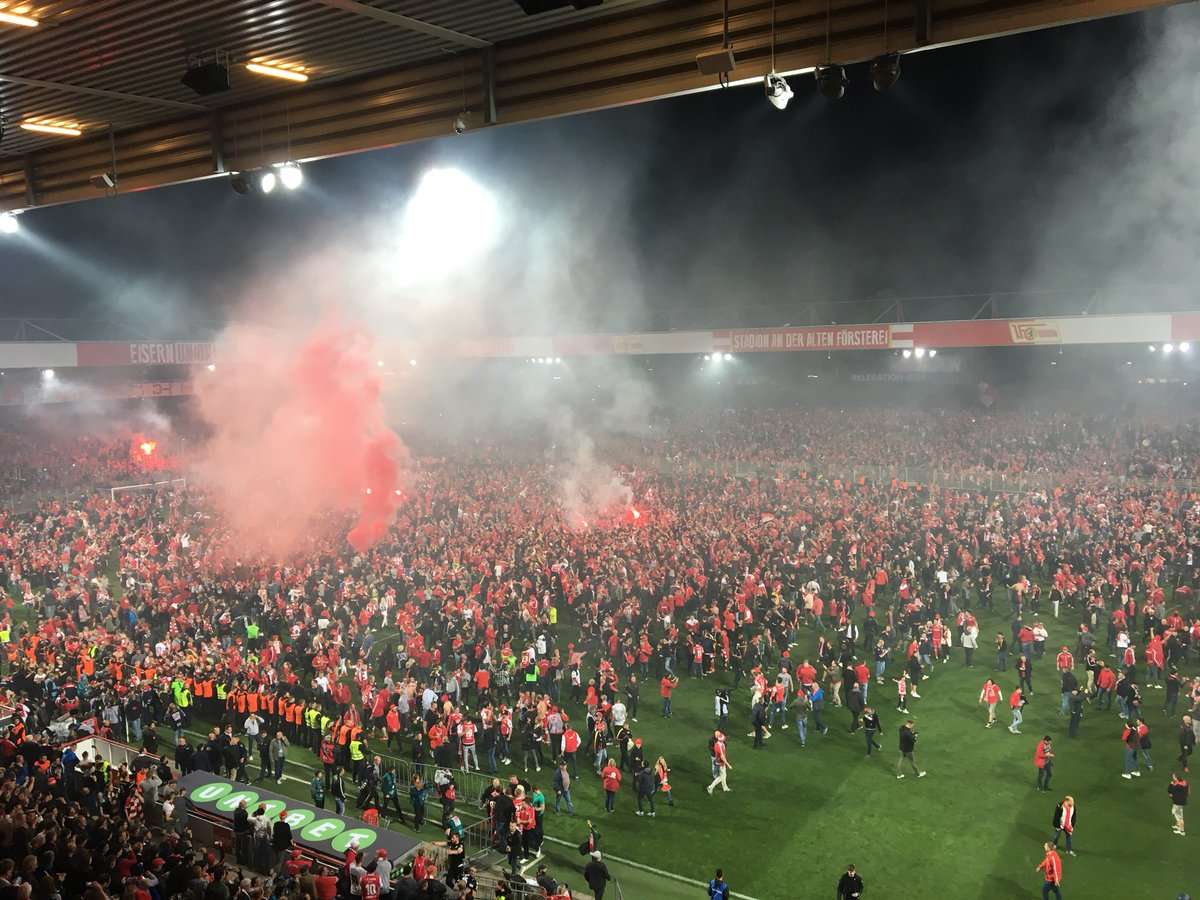Life in Berlin after the wall had been raised wasn’t easy. It’s perhaps as obvious as evident, but we tend to neglect the human conditions when discussing football in East Germany. Berlin was the playground of politics, a platform where football had the difficult task of having to develop on its own, without help from institutions or different financial powers. It was different from the entirety of western Europe and this is one of many reasons to why football in Berlin has never progressed further than Hertha’s mild, sporadic brilliance.
However, Hertha BSC is one of five Berlin-based clubs to have reached the top tier of German football and one of four from western Berlin. The tantalising tales of Hertha’s demise and scandals in the mid-sixties make a great film, but the calamities that they lead to make a much better slapstick comedy. Tasmania Berlin were promoted to the Bundesliga in 1966 when Berlin were denied a license due to them having bribed players to come and play for them, as Berlin wasn’t the most popular or most wanted place to go to for most professional players. Thus, Hertha were done and dusted in the Bundesliga, paving the horribly calamitous path for the worst team to ever set foot in the Bundesliga: Tasmania Berlin.
Set in a desolate and part-green, part-brown park in the middle of Neukölln, Tasmania played a sorry season of football in front of an all time record-low attendance of about 700 spectators per game. They managed to gather 8 points in 34 games, winning one against Karlsruhe, managing to draw a few and losing the rest. Their goal difference will never ever, hopefully, be beaten and their sorry band of footballers will never see the top ten of any list in German football history. Tasmania’s sudden rise and demise is a direct result of a catastrophic footballing environment in Berlin, one that’s very much a product of the problematic political situation of the city during that time. Being divided, amassing a good gang of footballers cannot have been an easy task and the lack of any big football power from Berlin shows this as evidently as anything.
Tennis Borussia Berlin was the third club to reach Bundesliga status and their journey was happier than Tasmania’s, even though they suffered two relegations. Tennis Borussia, originally formed as a tennis and table tennis club, played 11 straight seasons in the Regionalliga Berlin (second tier) before winning and gaining promotion to Bundesliga in 1974. They finished second to last, however, and got relegated. They managed the same feat the season after and won the Regionalliga, but once again finished second to last in the Bundesliga. This makes them the most successful Berlin-club, apart from Hertha. It might sound strange, considering the size of Berlin as a city, but that’s the harsh reality of the historical quality of football in the German capital. TeBe now ply their trade in the German fifth division and play their home games in front of fans at the historical Mommsenstadion, named after the German father of history Theodor Mommsen.
Blau-Weiss Berlin is a club most forget. One hopeless season at the Olympiastadion was all they got before they met their demise at the hands of other financially stronger powers. A romantic story but the harsh reality of football rarely takes romance into consideration while crafting its success stories. Amassing 18 points in 34 games, beating only Borussia Mönchengladbach, Waldhof Mannheim and Eintracht Frankfurt, it was, all-in-all, a season to forget. However, it became the opposite. After getting relegated, the club soon delved into the depths of financial hardship and soon declared bankruptcy. Their maiden season in Bundesliga became their only ever season in any top tier and was the nail in the coffin for a strained economy. It was probably worth it, though.
Four clubs from Berlin has graced the Bundesliga with their hardship and passion for the sport despite everything surrounding the city and the clubs. Four clubs, until the 27 May 2019 when Union Berlin decided to keep VfB Stuttgart out to gain promotion to the Bundesliga as the first ever club from East Berlin to do so. Shaping the future writings of history, this marvellously cultural club became the Berlinian pièce de résistance of tradition, the main clue to where the key to luck in the German world of football may be. It points us to the treasure, probably marked with an “X” (in the shape of a ”Y”), that the zealots of fandom have promised us. The salvation is here, Union has made it, the restoration of German values is upon us.
The rise of Union Berlin is a good sign of things to come. However, it’s also a good showing of what the awesome power of history can do to a culture. It’s now 30 years since the wall was torn down. 30 years have gone by and Union are the first ‘proper’ East German team to make the leap. This underlines some unkind structural problems within the East German football sphere, problems that have been boiling beneath the surface, sipping out like sulphide gas from a volcano in the shape of Neo-Nazi fan bases and clashes between alt-right and far-left in the wake of a fan-related uprising against police and policy.
Being a politically active club with a strong fan base, Union is a voice against all forms of extremism and violence surrounding German football, while providing a good base and platform for their own fans and players to grow and develop from. In many ways, Union is the model club, the Platonic vision of what a football club shouldbe, taking responsibility for its constituency, allowing their fans a good voice in every action they take, while maintaining a professional image outwards with a respectable media team and a well-mannered social media account. They have, in different ways, mastered the difficult walk to success, through the smelly sulfide-infested marshes and trenches of horny investors and the human fallacies of greed and money-infused depravity.
They have managed to produce and maintain this model of a football club while fighting economical struggles, players leaving for bigger salaries in other leagues and countries and their own difficult history, probing to be as much a cornerstone of their success as a big and impassable bump in the road. It is admirable to see them rise this far, with all they’ve gone through, with all they have had to endure in their sorry and depressing history, one that has luckily culminated in the awesome feat of reaching the absolute top of German club football.
When the history of the DDR-Oberliga was recounted in 1990, three (actually two) Berlin-clubs had won the league. BFC Dynamo, backed by Stasi and the East German state, won ten straight titles between 1978 and 1988. FC Vorwärts Berlin won six titles, but four were won under the name ASK Vorwärts Berlin, which later transformed into FC Vorwärts Frankfurt (Oder). BSG Rotation Babelsberg, SG Lichtenberg 47, BSG Einheit Pankow and 1. FC Union Berlin joined these as Berlin-based clubs to play in DDR-Oberliga.
Officially founded as SG Union Oberschönewiede in 1945, Union Berlin was one of the oldest clubs in East Berlin, even though the name Union Berlin was taken first in 1966. Union’s history in the DDR-Oberliga was yoyo-like. They won the East German cup in 1968 and reached another final in 1986. They spent 19 seasons in the league, playing 520 games, winning 144, drawing 135 and losing 241. They scored 571 goals and conceded 868 in these years, which is the worst goal difference in the DDR-Oberliga’s history, never winning the league, but lifting the cup on one occasion, therefore playing in the Cup Winner’s Cup the following season (1968-1969). This still is the biggest triumph of this Berlinian minion of German football.
In 1989, the city of Berlin took a stand against Rudyard Kipling’s law and listened to diplomacy and tore down the wall that had formed their lives for so many a decade. Union’s future, much like the future of Europe, would not be formed in the same mould as their history. Union were soon a part of the system, but fell out and struggled to fit in with their new and harsh reality. They had never had to rely on providing for themselves before, so football was now a difficult market for a club used to plying its trade in a system where the concept of a market in its most fundamental essence is frowned upon with excellent abhorrence.
After a lacklustre tête-a-tête with the gods of football, they avoided bankruptcy and have managed to make themselves a regularly solid living in the lesser parts of German football. There they had dwelled until gaining promotion to the 2. Bundesliga in 2001. In the same year, they managed to reach the final of the DFB-Pokal, but lost to Schalke 04. The following year they played European football and got so far as the second round, where they were knocked out by a Bulgarian side. Union’s history from 2001 until now is rather linear, but interesting nonetheless. In 2005, they slipped down to the fourth division, but soon climbed the ladder to the newly formed 3. Liga, which they were founding members of. They won the inaugural season of the 3. Liga and were promoted to the 2. Bundesliga in 2009, where they played until 27 May 2019, the day football changed forever for the Iron Union from Köpenick, Berlin.
DOO DOO DOO UNION! 🔴 pic.twitter.com/uygh0Q9MJX
— 1. FC Union Berlin (@fcunion_en) May 27, 2019
A green pitch, a few white lines, drew on the grass with ruthless German efficiency, a stadium packed with red, newly washed shirts. A day of hard work is long forgotten, the day has been highly overshadowed by this event, the biggest event of the lives of these football fanatics in the eastern parts of Berlin this beautiful Monday night. Magic will occur tonight, there is no doubt about it. There’s this buzz in the air, a buzz foreshadowing the madness to come. This pitch, green and white, will be tainted by unwelcome feet tonight, but the owners of those feet will care less than a Peruvian turtle cares about the political schemes in Guatemala. This is the playground of fanatics, a field of dreams, nothing less and nothing more than football and all that it encapsulates.
They have now become the fifth club from Berlin to ever play in the Bundesliga. And they might be the most important of the bunch. Union’s rise to power in Eastern Berlin has been a welcome sight to most. Them staying up is not in any way probable, but them having graced the Bundesliga with their presence makes for a good story, if not for something much more useful. Union proves that wonders can still happen in 2019, they prove that the German football values that have become diminished and tainted by RB Leipzig and Hoffenheim still exist in their most absolute essence. But they prove something even more useful than that. 1. FC Union Berlin have now proven that history can be overcome and that is their most important lesson and the cornerstone to their awesome piece de resistance against the dogma of football modernity.
By Axel Falk.










